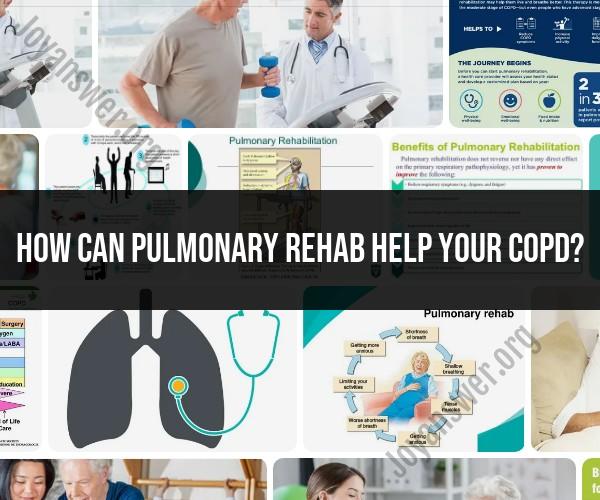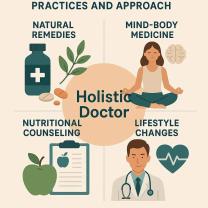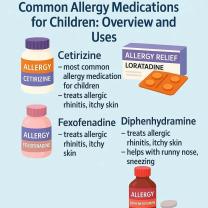How can pulmonary rehab help your COPD?
Pulmonary rehabilitation (PR) is a specialized program designed to improve the overall well-being and quality of life for individuals with chronic obstructive pulmonary disease (COPD). COPD is a progressive lung condition characterized by airflow limitation, which includes conditions like chronic bronchitis and emphysema. Here's how pulmonary rehab can help individuals with COPD:
Improving Respiratory Function: Pulmonary rehab focuses on exercises and activities that help individuals with COPD improve their lung function and capacity. Through structured exercise programs, participants can enhance their respiratory muscle strength, making it easier to breathe.
Enhancing Exercise Tolerance: One of the primary goals of pulmonary rehab is to increase exercise tolerance. Participants engage in supervised exercise routines that gradually build their endurance and stamina, allowing them to perform everyday activities with less shortness of breath.
Symptom Management: Pulmonary rehab teaches COPD patients techniques for managing their symptoms, including breathlessness and coughing. Participants learn strategies to control and reduce symptoms in daily life.
Education: PR programs offer educational components that help individuals better understand COPD, its triggers, and how to manage the condition effectively. Education also includes learning about medications, oxygen therapy, and the importance of a healthy lifestyle.
Nutritional Guidance: Proper nutrition is crucial for individuals with COPD. Pulmonary rehab programs often include guidance on maintaining a balanced diet to support overall health and energy levels.
Psychosocial Support: Dealing with a chronic illness like COPD can be emotionally challenging. Pulmonary rehab provides psychosocial support and counseling to address issues like anxiety, depression, and coping strategies.
Medication Management: Participants are educated on how to properly use their medications, inhalers, and other respiratory devices to maximize their effectiveness.
Smoking Cessation: Smoking is a major risk factor for COPD. Pulmonary rehab programs often include resources and support for individuals who want to quit smoking.
Lung Disease Management: Beyond COPD, PR programs may help individuals manage other lung conditions and comorbidities, such as asthma or pulmonary fibrosis.
Enhancing Quality of Life: By addressing the physical, emotional, and educational aspects of living with COPD, pulmonary rehab aims to improve an individual's overall quality of life. This can include increased independence and participation in daily activities.
It's important to note that pulmonary rehabilitation is a structured and supervised program typically conducted in a clinical setting. It is tailored to an individual's specific needs and stage of COPD. Participants work closely with healthcare professionals, including respiratory therapists, physical therapists, and nurses, to create a personalized rehabilitation plan.
Pulmonary rehab is recognized as an effective component of COPD management, and it can significantly benefit individuals by slowing the progression of the disease, reducing hospitalizations, and improving overall lung health and quality of life. If you have COPD or know someone who does, consult with a healthcare provider to determine if pulmonary rehab is an appropriate and beneficial option.
Enhancing COPD Management with Pulmonary Rehabilitation
Pulmonary rehabilitation (PR) is a comprehensive program designed to help people with chronic obstructive pulmonary disease (COPD) manage their condition and live better lives. PR programs typically include a combination of exercise, education, and support groups.
PR can be a valuable addition to COPD management for a number of reasons. It can help to:
- Improve exercise tolerance and reduce shortness of breath
- Increase muscle strength and endurance
- Improve quality of life and reduce symptoms such as fatigue and depression
- Reduce the need for hospitalization
- Extend life expectancy
The Benefits of Participating in a Pulmonary Rehab Program
There are many benefits to participating in a pulmonary rehab program, including:
- Improved exercise tolerance and reduced shortness of breath: PR programs typically include a variety of supervised exercises that are designed to improve participants' exercise tolerance and reduce their shortness of breath.
- Increased muscle strength and endurance: PR programs also typically include exercises that are designed to increase participants' muscle strength and endurance.
- Improved quality of life and reduced symptoms: PR can help to improve participants' quality of life by reducing symptoms such as fatigue and depression.
- Reduced need for hospitalization: PR can help to reduce the need for hospitalization in COPD patients.
- Extended life expectancy: PR has been shown to extend life expectancy in COPD patients.
What to Expect from Pulmonary Rehabilitation for COPD Patients
Pulmonary rehab programs typically last for 6-12 weeks and meet 2-3 times per week. Each session typically lasts for 2-3 hours.
PR programs typically include a combination of the following:
- Exercise: PR programs typically include a variety of supervised exercises, such as walking, cycling, and strength training. The exercises are designed to improve participants' exercise tolerance, muscle strength, and endurance.
- Education: PR programs also typically include educational sessions on a variety of topics related to COPD, such as disease management, breathing techniques, and nutrition.
- Support groups: PR programs often include support groups where participants can share their experiences and learn from each other.
If you have COPD, talk to your doctor about whether pulmonary rehab is right for you. PR can be a valuable addition to your COPD management plan and can help you to live a better life.













